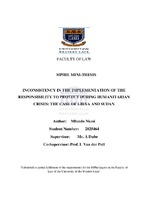| dc.contributor.advisor | Dube, A. | |
| dc.contributor.advisor | van der Poll, Letetia | |
| dc.contributor.author | Nkosi, Mfundo | |
| dc.date.accessioned | 2015-08-26T15:01:39Z | |
| dc.date.available | 2015-08-26T15:01:39Z | |
| dc.date.issued | 2014 | |
| dc.identifier.uri | http://hdl.handle.net/11394/4442 | |
| dc.description | Magister Legum - LLM | en_US |
| dc.description.abstract | The aim of this mini-thesis is to examine the inconsistency in the implementation of the responsibility to protect (RTP) principle during armed conflicts with specific focus on the case of Libya and Darfur. Furthermore the mini-thesis scrutinizes the criteria which are utilized universally and questions whether the principle is determined by factors such as economics, politics and location depending on each crisis. The significance of this minithesis derives from the need to make a contribution to the new interventionism debate and contribute to the growing literature on the doctrine of the RTP especially when it comes to the inconsistencies during its application which seems to be on the rise especially in the African continent. The mini-thesis was guided by the following assumption that there are inconsistencies when it comes to the application of the RTP under humanitarian law. The mini-thesis also embarks on an enquiry into the legal aspects of the RTP doctrine and the legal status of humanitarian intervention. It is worth noting that the RTP doctrine does not concentrate on every human rights violation or abuse of power, even when these are very serious as in the case of Sudan. It certainly does not empower or establish an obligation on the international community to respond by over-riding the offending state’s sovereignty. The initial intention of the RTP was aimed at preventing mass attacks or large scale violations involving genocide, war crimes, ethnic cleansing and crimes against humanity. It is greatly disappointing to note that the international community at large tends to overlook the more severe crises which have more casualties and turn their eyes on less serious humanitarian crises. This raises concern about the extent of the inconsistency in the application of the RTP. The question that begs an answer therefore is why intervene in Libya and not Darfur? In conclusion to this mini-thesis I came to the realization that inconsistencies within the application of the RTP exist because humanitarian intervention under the RTP has a massive political element which affects implementation. The RTP is often used as a justification for states to act in conflicts when there is no domestic support for more direct political intervention. Thus, I believe that intervention can never be completely humanitarian driven until the five RTP precautionary principles are used as a guideline or criteria for interventions. | en_US |
| dc.language.iso | en | en_US |
| dc.publisher | University of the Western Cape | en_US |
| dc.subject | Humanitarian intervention | en_US |
| dc.subject | War crimes | en_US |
| dc.subject | Responsibility to protect (RTP) | en_US |
| dc.subject | African Union | en_US |
| dc.title | Inconsistency in the implementation of the responsibility to protect during humanitarian crises: the case of Libya and Sudan. | en_US |
| dc.rights.holder | University of the Western Cape | en_US |

